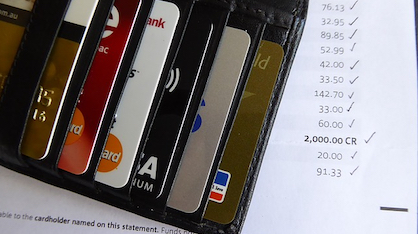Follow the money and save – check your bank statements
November 14, 2017
It’s true, checking your bank statement every time you get one can really help you save money. If you find a mistake on your statement you can challenge it with your bank or the company who has taken out the money, to ensure you are only paying for thing you need to.
Check what’s been spent
Look at what you have spent during the statement period by going over the ‘debits’ column of the statement. You can check these debits against your receipts to make sure they’re right.
Be sure to check any regular payments or direct debits, in case you’ve been charged for a loan you’ve already paid off or for services you’ve cancelled.
If you spot any payments that don’t look right, contact your bank or credit provider straight away. Read our article on mistaken transactions to find out what to do.
Look at how much money has come into your account during the statement period.
Make sure all the income you are entitled to is there.
Your income may include:
- Salary from work
- Centrelink payments
- Child support payments
- Pension or other income payments
If any income is missing ask your boss about it or contact Centrelink.
|
Video: Top tips for checking your bank statement |
|
|
Financial counsellor Kristen Hartnett gives her tops tips on checking your bank statement. Kristen has many years’ experience helping people deal with their money problems. You can find a financial counsellor near you on our financial counsellor map. |
|
Check your income is right
Look at how much money has come into your account during the statement period. Make sure all the income you are entitled to is there.
Your income may include:
- Salary from work
- Centrelink payments
- Child support payments
- Pension or other income payments
If any income is missing ask your boss about it or contact Centrelink.
Assess and reduce the fees you are paying
Look at the fees you have been charged. Fees could include: Start Smart Tip
- Account keeping fees
- ATM fees
- Cash advance fees
- Phone banking fees
- Internet banking fees
- EFTPOS fees
- Branch fees
- Overdrawn account fees
If you are concerned about the fees you are paying, talk to your bank about an account that has:
- No account keeping fees
- Free monthly statements
- No minimum deposit amounts
- No overdrawn fees
You can find which financial institutions offer these basic bank accounts on the Australian Bankers’ Association’s Affordable Banking website.
|
Case study: Sally finds a spare $450 in her bank statement
One day her friend convinced her to start checking them to see what was going on with her account.When she checked the most recent statement Sally realised that the Christmas Hamper payments that she had cancelled 5 months ago were still coming out at $45 a fortnight over 10 weeks. She rang the company and they apologised and put the money back into her account. That extra $450 meant she was able to pay off other debts and finally start to save a little bit of money each week.
|
Monitor your balance
It’s a good idea to check your account balance. This is how much money is left in your account after your bills and other expenses have been paid. If it’s going up then you can relax. If it’s going down, you are spending more than your earn. See our simple ways to save money webpage for ideas on how to spend less.
Once you have checked your statement and know where your money is going, it’s a great time to do a budget. Use our budget planner to plan your saving and spending.
Reading your bank statements can be a way to find savings in your budget that you didn’t know you had and get money back that’s rightfully yours.
Reproduced with the permission of ASIC’s MoneySmart Team. This article was originally published at https://www.moneysmart.gov.au/managing-your-money/banking/checking-your-bank-statement
Important note: This provides general information and hasn’t taken your circumstances into account. It’s important to consider your particular circumstances before deciding what’s right for you. Although the information is from sources considered reliable, we do not guarantee that it is accurate or complete. You should not rely upon it and should seek qualified advice before making any investment decision. Except where liability under any statute cannot be excluded, we do not accept any liability (whether under contract, tort or otherwise) for any resulting loss or damage of the reader or any other person.
Powered by WPeMatico

 Sally was afraid to open her bank statement every month because she knew there would not be much money in her account. She really didn’t want to know how little money was in there so she let the statements pile up and never even opened them.
Sally was afraid to open her bank statement every month because she knew there would not be much money in her account. She really didn’t want to know how little money was in there so she let the statements pile up and never even opened them.